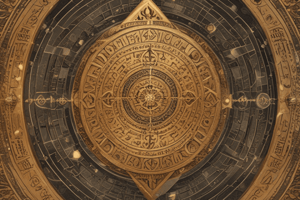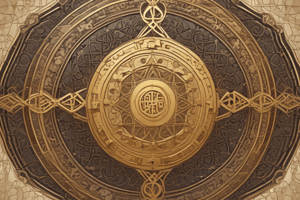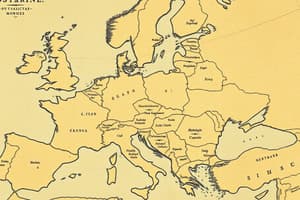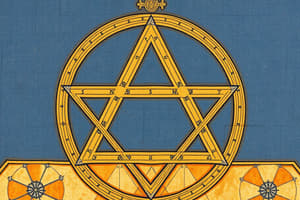Podcast
Questions and Answers
What numeral system did the Hindu-Arabic numeral system replace in Europe?
What numeral system did the Hindu-Arabic numeral system replace in Europe?
- Roman numeral system (correct)
- Binary numeral system
- Arabic numeral system
- Decimal numeral system
Which mathematician is known for using a system of rectangular coordinates in the 14th century?
Which mathematician is known for using a system of rectangular coordinates in the 14th century?
- Regiomontatus
- Nicholas of Cusa
- Fibonacci
- Nicole Oresme (correct)
What significant mathematical concept did Nicole Oresme first prove?
What significant mathematical concept did Nicole Oresme first prove?
- Divergence of the harmonic series (correct)
- Calculus principles
- Pythagorean theorem
- Prime factorization
What was Regiomontatus particularly known for in mathematics?
What was Regiomontatus particularly known for in mathematics?
Which of the following mathematicians influenced later mathematicians like Leibniz and Cantor?
Which of the following mathematicians influenced later mathematicians like Leibniz and Cantor?
What did Oresme use to graphically show the relationship between speed and distance?
What did Oresme use to graphically show the relationship between speed and distance?
During which century did the Renaissance movement in mathematics primarily begin?
During which century did the Renaissance movement in mathematics primarily begin?
What was Regiomontatus's significant publication in trigonometry called?
What was Regiomontatus's significant publication in trigonometry called?
What was the primary focus of scholastic scholars during the Dark Ages?
What was the primary focus of scholastic scholars during the Dark Ages?
Which translation was significant in introducing algebra to Europe?
Which translation was significant in introducing algebra to Europe?
Which numeral system was primarily used in Europe during the medieval period?
Which numeral system was primarily used in Europe during the medieval period?
What role did trade and commerce play in the development of mathematics during the medieval period?
What role did trade and commerce play in the development of mathematics during the medieval period?
Which invention in the mid-15th Century contributed to the spread of mathematical knowledge?
Which invention in the mid-15th Century contributed to the spread of mathematical knowledge?
What type of abacus was common in the medieval period?
What type of abacus was common in the medieval period?
Who was the first great medieval mathematician in Europe?
Who was the first great medieval mathematician in Europe?
What was a notable area of stagnation during the Dark Ages?
What was a notable area of stagnation during the Dark Ages?
Flashcards are hidden until you start studying
Study Notes
Medieval Period Overview
- Europe experienced a decline in intellectual pursuits during the Dark Ages, from the 4th to 12th centuries, primarily focusing on humanities and avoiding advancements in science and mathematics.
- Scholastic scholars debated metaphysical topics, neglecting practical applications of mathematics.
- European knowledge of mathematics largely derived from Boethius' translations of Greek works, particularly those of Nicomachus and Euclid.
Mathematical Tools and Systems
- Roman numeral system was inefficient for trade and calculations, relying heavily on the abacus derived from Greek and Roman models.
- Medieval abaci functioned on a "bi-quinary" model using beads to represent units and epochs for calculations.
Influence of Eastern Knowledge
- By the 12th century, trade with the East began to disseminate Eastern mathematical concepts into Europe.
- Robert of Chester translated Al-Khwarizmi's algebra text into Latin, facilitating access to advanced mathematical ideas.
- Translations of Euclid's "Elements" by figures like Adelard of Bath and Gerard of Cremona contributed to the revival of geometry and theoretical mathematics.
Rise of Practical Mathematics
- The expansion of trade necessitated improved arithmetic skills, integrating mathematics into everyday business practices.
- The invention of the printing press in the mid-15th century allowed for the widespread distribution of arithmetic literature aimed at business professionals.
Key Figures in Medieval Mathematics
- Fibonacci, known for the Fibonacci Sequence, significantly promoted the Hindu-Arabic numeral system in Europe, rendering Roman numerals obsolete by the early 13th century.
- Nicole Oresme utilized rectangular coordinates before Descartes and was a pioneer in developing time-speed-distance graphs and fractional exponents, also proving the harmonic series diverges.
- Regiomontatus advanced trigonometry as a separate discipline from astronomy with his work "De Triangulis," marking a foundational text for future study in trigonometry.
- Nicholas of Cusa, a 15th-century philosopher and mathematician, explored concepts of infinity, influencing later thinkers like Leibniz, and posited early ideas about planetary motion.
Renaissance Mathematics
- The Renaissance, originating in 14th-century Italy, facilitated a revival of classical learning, merging science with artistic expression.
- Figures such as Leonardo da Vinci exemplified the interconnection of art and science during this period, leading to groundbreaking advancements in mathematical concepts.
Contributions to Mathematical Thought
- Oresme's graphical representation linking speed and time highlighted the relationship between acceleration and distance traveled.
- Cusa's non-standard ideas about the universe hinted at the heliocentric theories later fully developed by Copernicus and Kepler, marking significant shifts in astronomical thought.
Studying That Suits You
Use AI to generate personalized quizzes and flashcards to suit your learning preferences.





